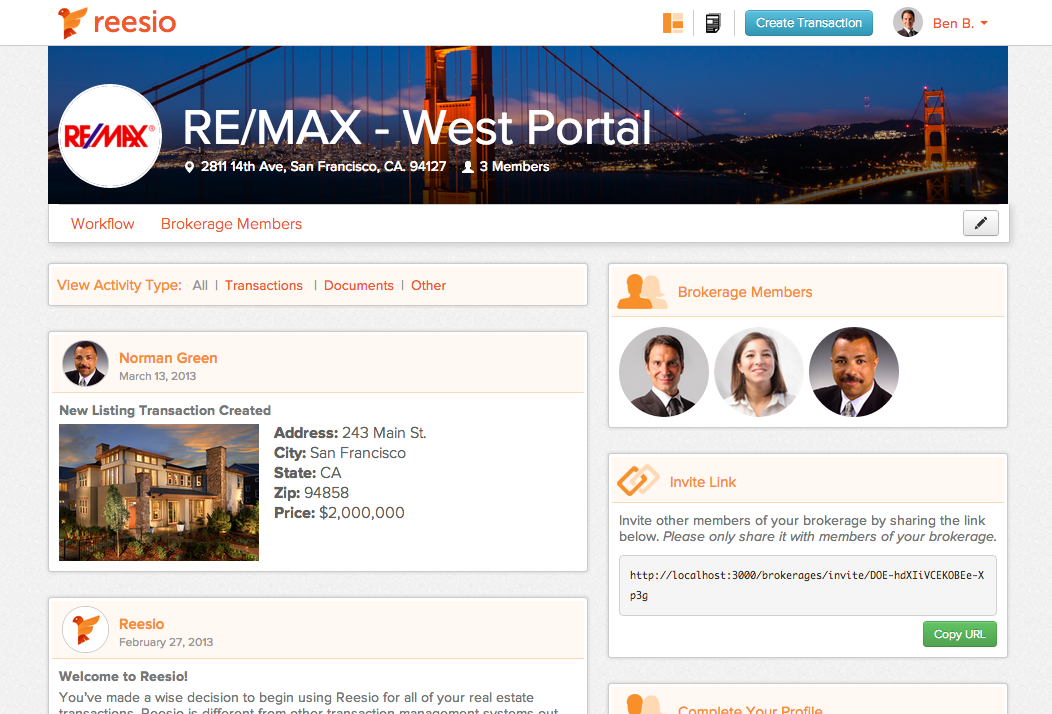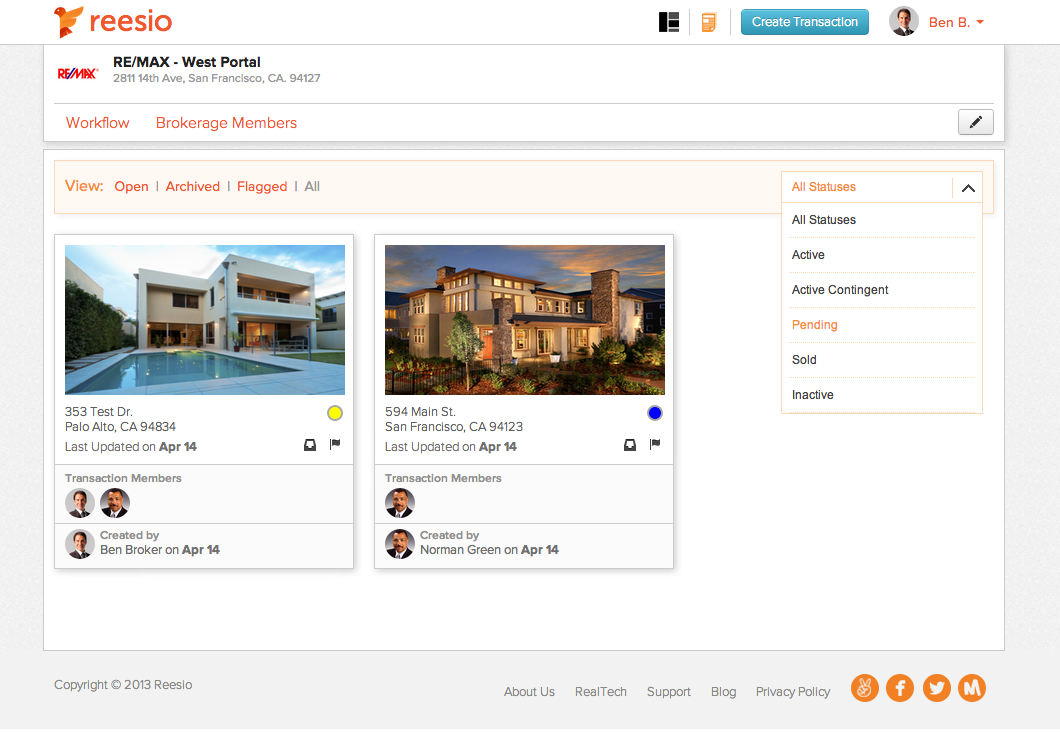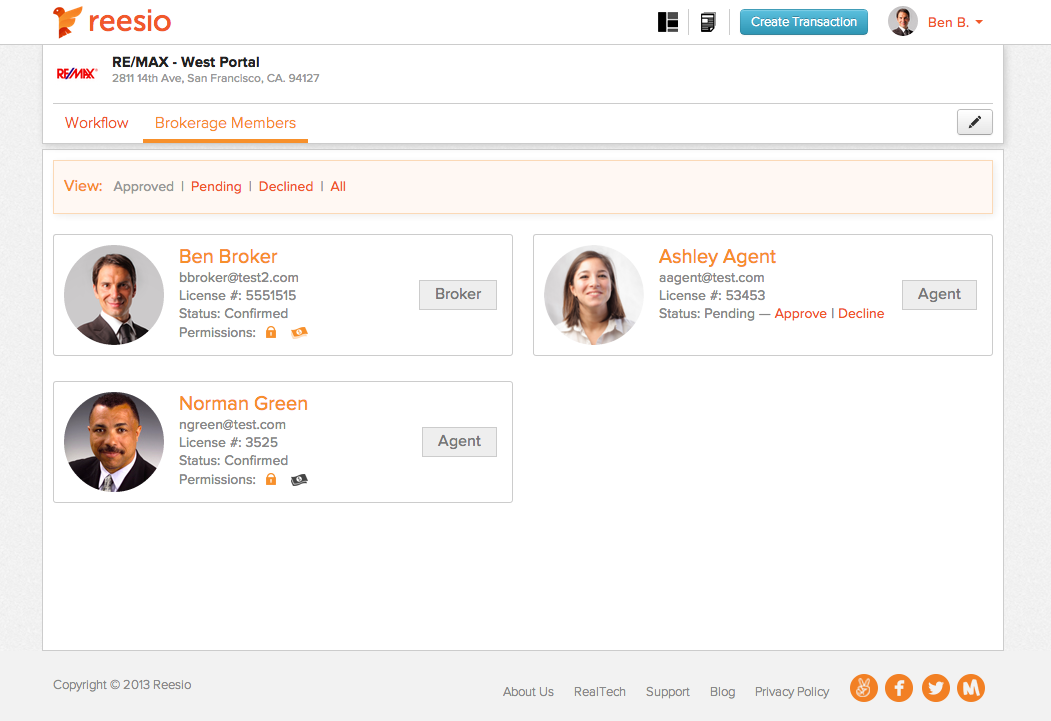San Francisco-based startup Reesio officially debuted a transaction management product for real estate brokers today that the company hopes will fuel exponential growth.
Reaslo Inc., which does business as Reesio, is a real estate technology company and a licensed California brokerage founded in January 2012.
Originally designed to help for-sale-by-owner sellers advertise their properties on local multiple listing services, Reesio soon switched its business model to offer its platform exclusively to real estate agents.
After taking its platform nationwide in November, Reesio is now reaching out to those who manage agents: real estate brokers.
More than 300 agents have signed up for Reesio’s platform since its official launch last fall, but the company sensed an expansion opportunity when it also received what Mark Thomas, Reesio’s co-founder and CEO, described as “a tremendous amount of inquiries from brokers.”
“These brokers liked the design and look and feel of our product, but of course, they needed added features that let them manage their agents’ transactions,” Thomas said in a statement. “We had brokers with 50, 100, and even 250 agents that we had to turn away because we didn’t have a product that they wanted. Now, we can serve that group.”
[fliqz id=”9892910235f84b6f89996e52e4af8463″]
Reesio CEO Mark Thomas discusses Reesio’s new broker product and the 500 Startups Accelerator with Inman News reporter Andrea V. Brambila.
With Reesio’s agent platform, both buyer’s agents and listing agents can create transactions and invite clients and other parties, such as a loan officer or the agent on the other side of the deal.
Reesio sets up a checklist of common tasks that need to be completed during a transaction, which agents can then customize by adding or subtracting tasks. From this workflow, the platform prompts agents to upload relevant documents that the parties can then review and e-sign within Reesio’s cloud-based dashboard.
The platform automatically notifies the parties of what they need to do next and lets them know what the others have done. Activity is time-stamped and the parties can send each other in-system messages.
With the new broker offering, instead of agents creating their own workflows, brokers can create them for their agents, making sure they follow specific steps throughout a transaction.
“Given the liability that brokers have for their agents’ actions, this gives brokers an added peace of mind,” Reesio said.
Screen shot of Reesio broker dashboard
Broker dashboards are modeled on the layout of Facebook Timeline. Brokers can upload a cover photo and logo. They can also create workflow templates for agents or assign them to one of two included default templates: one for buyer’s agents and one for listing agents.
Screen shot of Reesio workflow templates
An activity feed allows brokers to see when transactions have been created. Brokers can view a list of their agents’ transactions through a Pinterest-like image gallery and go to each transaction to check its progress, review documents, and send their agents messages.
Screen shot of Reesio transaction list
Agents and brokers who create Reesio accounts can also search for and join brokerages that have already been created by previous users or create a new brokerage account if one has yet to be created. Brokers are responsible for adding and approving agent members.
Screen shot showing brokerage members
Reesio’s pricing for individual users starts at $20 per month or $195 per year and goes down depending on the number of users a brokerage has, the company said. Originally $49 per month at the time of the platform’s national launch, the company almost immediately changed the pricing to match that of its rivals, Thomas said.
Reesio’s direct competitors are companies like dotloop and Cartavi, each of which provide a paperless transaction management platform for real estate professionals.
For brokers, Reesio offers an enhanced billing feature that automatically calculates a multi-agent pricing discount, if available, without the need to contact a Reesio sales representative.
“This lets brokers jump right in and sign everyone up in their brokerage quickly and easily,” The company said. “It also gives Reesio an edge because most of its competitors require brokers to manually contact their companies’ sales representatives to find out what the mult-agent discount is — an oftentimes painful and arduous process.”
At the moment, a discount kicks in at 20 agents, though that may go down to 10 agents in the future, Thomas said. According to the National Association of Realtors, the typical brokerage consists of 23 agents and brokers. At that size, a brokerage could expect a monthly cost of $19 or so per month, Thomas said.
The company claims its $195-per-year price point is actually cheaper than its competitors, particularly since Reesio does not require a separate subscription for e-signatures. DocuSign’s e-signing service has been incorporated into the Reesio platform for nearly a year, though that is about to change.
As of May 20, Reesio will switch to HelloSign, the e-signature service from electronic fax company HelloFax Inc. Thomas said he thought the product, user experience, and cost were better with HelloSign.
It also helped that HelloSign is a startup “focused on working with other startups,” Thomas said.
Earlier this month, Reesio was accepted into the 500 Startups Accelerator, a startup-incubation program run by big-name investors. The company’s selection was a sign that investors are increasingly eyeing the real estate technology space, which is attracting more interest since the successful initial public offerings of companies like Zillow and Trulia.
Along with its acceptance into the program, Reesio received $50,000 from 500 Startups, adding to the $70,000 it had already raised from angel investors. The company intends to close a seed round of between $500,000 and $1 million by the end of July or August, Thomas said.
In the meantime, the company hopes to roll out three main features in the next three or four months. These include public transaction pages where, for instance, listing agents can post disclosures for view by multiple buyer’s agents. Listing agents would include a link to the public page in the local MLS.
In the long term, Thomas envisions these public transaction pages perhaps even taking the place of the MLS in this role.
“Possibly if people really like the look and feel of that public page, maybe people will start using that instead of uploading disclosures to the MLS. A lot of MLSs are kind of clunky. If it’s well-designed, easy to use, crisp and clear, that’s a better experience,” he said.
A second feature Reesio plans to incorporate is the ability for users to upload document templates and prepopulate them within the platform, rather than users having to enter information using a different product, such as zipForm, Thomas said.
Reesio also plans to build a tool within the platform that will allow users to submit, accept, counter, or reject offers.
These additional features will help establish Reesio as the “social hub for all things real estate,” Thomas said.
Connect with Reesio CEO Mark Thomas (@entrepreneurSF).




